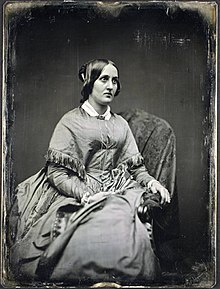Helen Hunt Jackson wrote not only poetry, but essays and romance novels. Sara Jane Lippencott aka Grace Greenwood not only wrote essays,poetry, worked as a correspondent and also booked speaking engagements. And who can forget Isabella Bird, who traveled the world and then combined letters to her sister to create the books "A Lady's Life in the Rocky Mountains" and "The Yangtze Valley and Beyond: An Account of Journeys in China" to name a few.
 |
| Sara Jane Lipencott from Wikepedia |
The object of the author in presenting this work is to furnish a practical summary of the infant's hygiene and physical development. The aim of the book is to be a guide to mothers, particularly young and inexperienced ones. It purposes to teach and help a mother to understand her babe, to feed it properly, to place it in healthful surroundings, and to watch its growth and development with intelligence, and thus relieve in a measure the undue anxiety and nervous uncertainty of a new mother. The book is not intended in any measure to take the place of a physician, but rather to aid the physician in teaching the mother to care properly for her babe when well, that she may better nurse it when sick.
Then of course there were the autobiographies.
Dr. Elizabeth Blackwell wrote: "Pioneer Work in Opening the Medical Profession to Women; Autobiographical Sketches"
Harriot Kesia Hunt wrote: "Glances and Glimpses: or, Fifty Years Social, including Twenty Years Professional Life"
Helena Modjeska wrote: Memories and Impressions of Helena Modjeska: An Autobiography"
 |
| Helena Modjeska from Wikepedia |
Helena Modjeska was an actress of some fame in the late 1800s who had been a star in Poland, but moved to the United States and began performing here. When she first arrived her performances were done somewhat phonetically, but she persevered and became one of the top Shakespearean actresses of her time.
Dr. Genevieve Tucker, who was appalled at infant mortality rate, stated “Decrease in infant mortality will be brought about more by strict hygiene and prevention of sickness then by any treatment of disease already begun, no matter how skillfully applied.” Dr. Tucker had a practiced in Pueblo, Colorado, and in 1898 she was elected president of the Colorado Homeopathic Medical Society.
Were the writings of these women best sellers? Who knows? But most of these works are still available either in print or in the public domain and give an insight into the world of the late 1800s and early 1900s.
We can only hope our works, be they fiction or non-fiction, bring knowledge and joy to our readers. We truly love telling our stories for you. As we approach the Thanksgiving holiday, know we are thankful for all of you.
Speaking of babies and women doctors, here is an excerpt from my book "Josie's Dream", a story about a women who wanted to be a doctor more than almost anything.
Josie was exhausted and it showed
in her walk and stance. The day had been one full of one emergency
after another. The day started with Homer and his lessons, but
quickly dissolved into a couple of broken bones, the Fresch boy, who
had gotten his cast wet, and cuts and scrapes. Just when things
looked like they would slow down, she’d had to go out to the Kruger
homestead to assist Mrs. Kruger, who had gone into labor early and
was having difficulty.
Josie was pleased that mother
and baby were doing fine. Still, she’d had a bit of trouble
convincing Mrs. Kruger and her husband that ‘laying in’ was not
the best for mother and child. When she’d had Mr. Kruger, who was
nervous about his first child, start to boil water, he’d no idea it
was to wash the sheets. But wash them she had, after enlisting the
poor father’s help. In the end, when she explained about
cleanliness and the way it would help with Mrs. Kruger getting better
more quickly, he fell right in. The love and pride the two had for
each other and their son gave Josie hope for the future. She knew she
would probably not get married for she knew most men wouldn’t want
such an independent woman who had her own job. She also knew she’d
never get a quilt that her grandmother made for the grand children
who married. That thought made her sad. But she’d made her choice.
It was on days such as this, when
she was tired but pleased with her day, that Josie wondered what the
world would be like in another fifty years. Would doctors still be
visiting patients, or would there be hospitals where those same
patients could stay if there were complications. What would her life
be like? The world continued on and, Josie knew, advances were being
made in so many areas.
Thinking
of Mrs. Packham, and her problems with the twins and their struggle
to thrive after getting the poisoned food, Josie dreamed of a time
when medicine would be able to help speed recovery or eradicate
disease altogether. When the science had advanced enough, doctors
would be able to tell if people like Mrs. Kruger were going to have
complications.
 |
| Click Here to Purchase on Amazon |
Doris Gardner-McCraw -
Author, Speaker, Historian-specializing in
Colorado and Women's History
Colorado and Women's History
Member of National League of American Pen Women,
Women Writing the West,
Pikes Peak Posse of the Westerners
Western Fictioneers
Angela Raines - author: Where Love & History Meet
For a list of Angela Raines Books: Here
Photo and Poem: Click Here
Angela Raines FaceBook: Click Here




